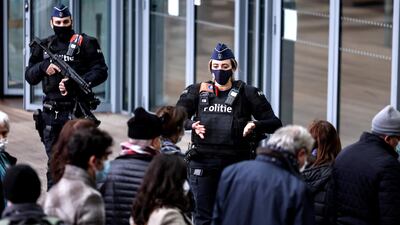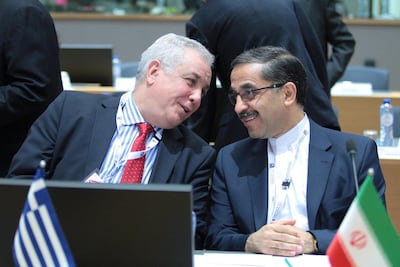A senior official reputedly from Iran's security ministry visited a high-ranking diplomat at a Belgian prison before he went on trial accused of masterminding a failed bomb plot against an opposition group.
Leaked prosecution documents showed that Gholamreza Lotfi was among five visitors from Iran who sought to see Assadollah Assadi at Hasselt jail in eastern Belgium following his arrest in July 2018.
Mr Assadi, a Vienna, Austria-based spymaster, is alleged to have planned the attack and handed over the bomb to a pair of sleeper agents to detonate at the annual meeting of the National Council of Resistance of Iran (NCRI) on the outskirts of Paris, where 25,000 had gathered.
The attack was foiled when Belgian police surrounded the car of the agents, a married couple, in a Brussels suburb after they left their home in Antwerp on June 30, 2018, and headed to the conference venue.
Mr Assadi was arrested at a motorway rest area in Germany as he headed back to Austria the following day.

The August 2019 list of visitors compiled by Belgium's state security service VSSE and seen by The National showed that 14 people sought to see Mr Assadi, including seven connected to Iran's embassy in Brussels, the Tehran delegation, a doctor and a lawyer.
The group from Iran said that they were attached to the foreign ministry, but dissidents identified Mr Lotfi as an official at the Ministry of Intelligence and Security, the country's most powerful and well-financed government department. A section of MOIS was placed on the European Union's terrorism blacklist in January 2019.
While giving seven hours of evidence following the failed attack, the leader of the NCRI, Maryam Rajavi, identified Mr Lotfi as a MOIS official within the chain of command for espionage operations that stretched to the top of government. She was said to be unaware of the visit at the time.

Mr Assadi also worked for MOIS, his trial heard, and was reputedly the most senior intelligence officer for Iran in Europe with responsibility for handling a network of agents across Europe.
The VSSE document did not say when the visits took place, how many each individual made or surmised what was discussed.
But Mr Assadi subsequently refused to appear before the court during his short trial in November when he was accused of being the key figure behind the attack.
He claims to have already been convicted at a “political trial”. He faces up to 20 years in prison if convicted when Belgian judges announce their verdict on Thursday.
The visitors also included Iran’s ambassador in Brussels, Peiman Seadat, and Ali Asghar Mohammadi, who is listed as the director general of consular affairs at the Iranian Foreign Ministry.
He featured on the ministry’s website in September 2019 hosting his Swiss counterpart in Tehran. The following month he met his counterpart from Finland when he “expounded on… the extensive efforts and sacrifices it has made in fight against the trafficking of human and illicit drugs”.
Shahin Gobadi, a spokesman for NCRI, said: “The regime's centres in Europe that play an active role in running the MOIS network in Europe, including its embassies, should be closed.

“The legal status of the regime’s agents should be revoked and they should be expelled from Europe.”
Iran’s Foreign Ministry and Mr Assadi’s Belgian lawyer were approached for comment.


